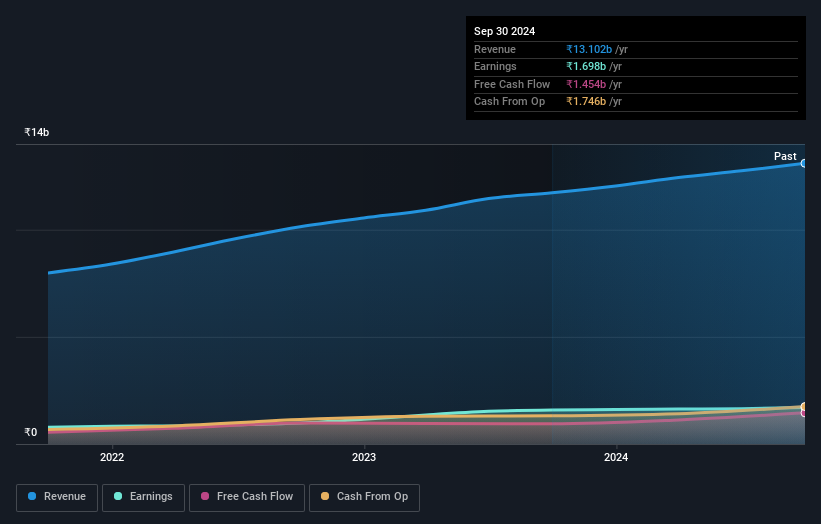ESAB India Limited's (NSE:ESABINDIA) market cap dropped ₹4.3b last week; individual investors who hold 74% were hit as were institutions

Key Insights
- Significant control over ESAB India by public companies implies that the general public has more power to influence management and governance-related decisions
- ESAB Corporation owns 74% of the company
- 16% of ESAB India is held by Institutions
Every investor in ESAB India Limited (NSE:ESABINDIA) should be aware of the most powerful shareholder groups. We can see that public companies own the lion's share in the company with 74% ownership. In other words, the group stands to gain the most (or lose the most) from their investment into the company.
While the holdings of public companies took a hit after last week’s 4.8% price drop, institutions with their 16% holdings also suffered.
In the chart below, we zoom in on the different ownership groups of ESAB India.
See our latest analysis for ESAB India

What Does The Institutional Ownership Tell Us About ESAB India?
Institutions typically measure themselves against a benchmark when reporting to their own investors, so they often become more enthusiastic about a stock once it's included in a major index. We would expect most companies to have some institutions on the register, especially if they are growing.
As you can see, institutional investors have a fair amount of stake in ESAB India. This can indicate that the company has a certain degree of credibility in the investment community. However, it is best to be wary of relying on the supposed validation that comes with institutional investors. They too, get it wrong sometimes. When multiple institutions own a stock, there's always a risk that they are in a 'crowded trade'. When such a trade goes wrong, multiple parties may compete to sell stock fast. This risk is higher in a company without a history of growth. You can see ESAB India's historic earnings and revenue below, but keep in mind there's always more to the story.

We note that hedge funds don't have a meaningful investment in ESAB India. The company's largest shareholder is ESAB Corporation, with ownership of 74%. This essentially means that they have extensive influence, if not outright control, over the future of the corporation. SBI Funds Management Limited is the second largest shareholder owning 9.8% of common stock, and Nippon Life India Asset Management Limited holds about 2.1% of the company stock.
Researching institutional ownership is a good way to gauge and filter a stock's expected performance. The same can be achieved by studying analyst sentiments. Our information suggests that there isn't any analyst coverage of the stock, so it is probably little known.
Insider Ownership Of ESAB India
The definition of company insiders can be subjective and does vary between jurisdictions. Our data reflects individual insiders, capturing board members at the very least. Company management run the business, but the CEO will answer to the board, even if he or she is a member of it.
Insider ownership is positive when it signals leadership are thinking like the true owners of the company. However, high insider ownership can also give immense power to a small group within the company. This can be negative in some circumstances.
We note our data does not show any board members holding shares, personally. Not all jurisdictions have the same rules around disclosing insider ownership, and it is possible we have missed something, here. So you can click here learn more about the CEO.
General Public Ownership
The general public, who are usually individual investors, hold a 10% stake in ESAB India. This size of ownership, while considerable, may not be enough to change company policy if the decision is not in sync with other large shareholders.
Public Company Ownership
Public companies currently own 74% of ESAB India stock. It's hard to say for sure but this suggests they have entwined business interests. This might be a strategic stake, so it's worth watching this space for changes in ownership.
Next Steps:
While it is well worth considering the different groups that own a company, there are other factors that are even more important. Case in point: We've spotted 1 warning sign for ESAB India you should be aware of.
If you would prefer check out another company -- one with potentially superior financials -- then do not miss this free list of interesting companies, backed by strong financial data.
NB: Figures in this article are calculated using data from the last twelve months, which refer to the 12-month period ending on the last date of the month the financial statement is dated. This may not be consistent with full year annual report figures.
Valuation is complex, but we're here to simplify it.
Discover if ESAB India might be undervalued or overvalued with our detailed analysis, featuring fair value estimates, potential risks, dividends, insider trades, and its financial condition.
Access Free AnalysisHave feedback on this article? Concerned about the content? Get in touch with us directly. Alternatively, email editorial-team (at) simplywallst.com.
This article by Simply Wall St is general in nature. We provide commentary based on historical data and analyst forecasts only using an unbiased methodology and our articles are not intended to be financial advice. It does not constitute a recommendation to buy or sell any stock, and does not take account of your objectives, or your financial situation. We aim to bring you long-term focused analysis driven by fundamental data. Note that our analysis may not factor in the latest price-sensitive company announcements or qualitative material. Simply Wall St has no position in any stocks mentioned.
About NSEI:ESABINDIA
ESAB India
Manufactures and sells welding and cutting equipment and consumables in India.
Flawless balance sheet average dividend payer.
Similar Companies
Market Insights
Community Narratives




